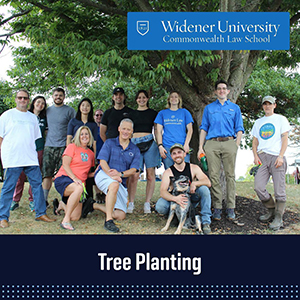
Volunteers dig in at Widener Commonwealth by planting trees, strengthening environmental commitment
Widener University Commonwealth Law School, in partnership with the Chesapeake Bay Foundation, hosted a successful tree planting event on campus on Sept. 21. The initiative, which drew students, staff, and friends, was part of a broader effort to improve watershed resiliency and protect the local ecosystem.
Environmental Law and Policy Society President Megan Bisco reflected on the event's success, noting its origins and significance: “This event was held last year, and it was in conjunction with Professor John C. Dernbach’s accomplishment ceremony. The tree planting was such a big hit last year that Assistant Dean of Student Affairs Randi Teplitz decided to do it again and reached out to me to get ELPS involved again."
Participants gathered in the morning, armed with shovels, gloves, and enthusiasm, to plant 50 native trees, including redbuds, flowering dogwoods, red maples, and oaks. These species were carefully selected for their ability to thrive in the region’s dry upland soils.
Bisco emphasized the ecological importance of the project: “Planting native trees is very important for our local ecosystems. Our community’s native trees have declined due to construction and invasive species like lantern flies. Although it will take a couple of years for the trees to grow, their addition will bring new habitats for many species, provide shade, and even supply food like pawpaw fruit for people and animals.”
The Chesapeake Bay Foundation provided tools and guidance throughout the event, with volunteers working in groups to plant and secure the trees. Kristen Heberlig, Watershed Resiliency Program Manager for the foundation, highlighted the long-term benefits of the effort. “Planting native trees helps stabilize soil, improve water quality, and provides vital habitats for wildlife,” Heberlig explained. “It’s wonderful to see so many people committed to making a lasting, positive impact on the environment.”
Bisco also shared a personal highlight from the day: “I was there a few minutes before it started, so my favorite moment was when I saw a crowd of people walking over, smiling, and ready to help. Everyone was genuinely excited to learn about the different trees and make an impact. It only took us one hour to plant fifty trees!”
The Chesapeake Bay Foundation, founded in 1966, is the largest independent conservation organization dedicated solely to saving the Chesapeake Bay. Its mission focuses on implementing science-based solutions to combat pollution and restore the Bay’s health. Through education, advocacy, and restoration projects like tree planting, the foundation continues its work to safeguard the watershed for future generations.
